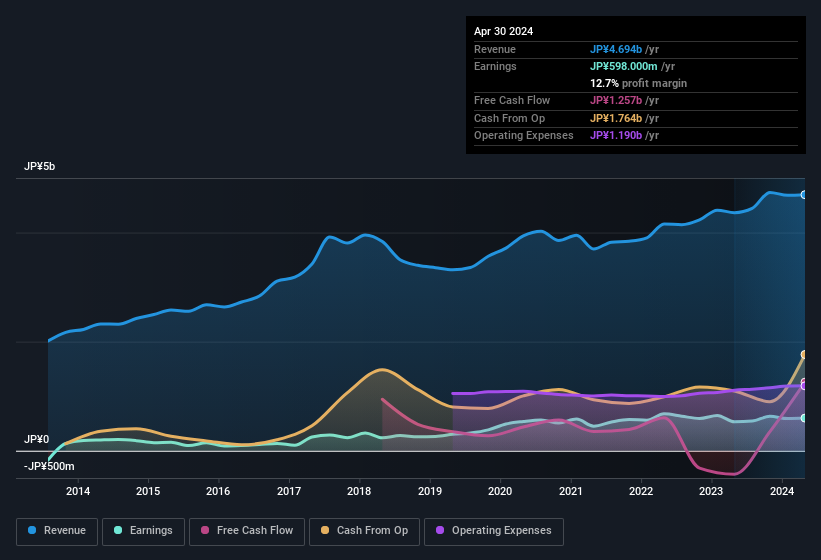System D (TSE:3804) Is Posting Promising Earnings But The Good News Doesn’t Stop There
Shareholders appeared to be happy with System D Inc.'s (TSE:3804) solid earnings report last week. Looking deeper at the numbers, we found several encouraging factors beyond the headline profit numbers.
See our latest analysis for System D

Examining Cashflow Against System D's Earnings
Many investors haven't heard of the accrual ratio from cashflow, but it is actually a useful measure of how well a company's profit is backed up by free cash flow (FCF) during a given period. The accrual ratio subtracts the FCF from the profit for a given period, and divides the result by the average operating assets of the company over that time. You could think of the accrual ratio from cashflow as the 'non-FCF profit ratio'.
Therefore, it's actually considered a good thing when a company has a negative accrual ratio, but a bad thing if its accrual ratio is positive. That is not intended to imply we should worry about a positive accrual ratio, but it's worth noting where the accrual ratio is rather high. To quote a 2014 paper by Lewellen and Resutek, "firms with higher accruals tend to be less profitable in the future".
System D has an accrual ratio of -0.23 for the year to April 2024. That indicates that its free cash flow quite significantly exceeded its statutory profit. To wit, it produced free cash flow of JP¥1.3b during the period, dwarfing its reported profit of JP¥598.0m. Notably, System D had negative free cash flow last year, so the JP¥1.3b it produced this year was a welcome improvement.
Note: we always recommend investors check balance sheet strength. Click here to be taken to our balance sheet analysis of System D.
Our Take On System D's Profit Performance
Happily for shareholders, System D produced plenty of free cash flow to back up its statutory profit numbers. Based on this observation, we consider it possible that System D's statutory profit actually understates its earnings potential! And on top of that, its earnings per share have grown at 34% per year over the last three years. Of course, we've only just scratched the surface when it comes to analysing its earnings; one could also consider margins, forecast growth, and return on investment, among other factors. So while earnings quality is important, it's equally important to consider the risks facing System D at this point in time. Case in point: We've spotted 1 warning sign for System D you should be aware of.
Today we've zoomed in on a single data point to better understand the nature of System D's profit. But there are plenty of other ways to inform your opinion of a company. For example, many people consider a high return on equity as an indication of favorable business economics, while others like to 'follow the money' and search out stocks that insiders are buying. While it might take a little research on your behalf, you may find this free collection of companies boasting high return on equity, or this list of stocks with significant insider holdings to be useful.
New: Manage All Your Stock Portfolios in One Place
We've created the ultimate portfolio companion for stock investors, and it's free.
• Connect an unlimited number of Portfolios and see your total in one currency
• Be alerted to new Warning Signs or Risks via email or mobile
• Track the Fair Value of your stocks
Have feedback on this article? Concerned about the content? Get in touch with us directly. Alternatively, email editorial-team (at) simplywallst.com.
This article by Simply Wall St is general in nature. We provide commentary based on historical data and analyst forecasts only using an unbiased methodology and our articles are not intended to be financial advice. It does not constitute a recommendation to buy or sell any stock, and does not take account of your objectives, or your financial situation. We aim to bring you long-term focused analysis driven by fundamental data. Note that our analysis may not factor in the latest price-sensitive company announcements or qualitative material. Simply Wall St has no position in any stocks mentioned.
Have feedback on this article? Concerned about the content? Get in touch with us directly. Alternatively, email editorial-team@simplywallst.com
About TSE:3804
System D
Develops and sells industry specific package software products in Japan.
Excellent balance sheet with proven track record and pays a dividend.
Market Insights
Weekly Picks

Solutions by stc: 34% Upside in Saudi's Digital Transformation Leader


The AI Infrastructure Giant Grows Into Its Valuation
Recently Updated Narratives

Perdana Petroleum Berhad is a Zombie Business with a 27.34% Profit Margin and inflation adjusted revenue Business
Many trends acting at the same time


Engineered for Stability. Positioned for Growth.
Popular Narratives


MicroVision will explode future revenue by 380.37% with a vision towards success


NVDA: Expanding AI Demand Will Drive Major Data Center Investments Through 2026



